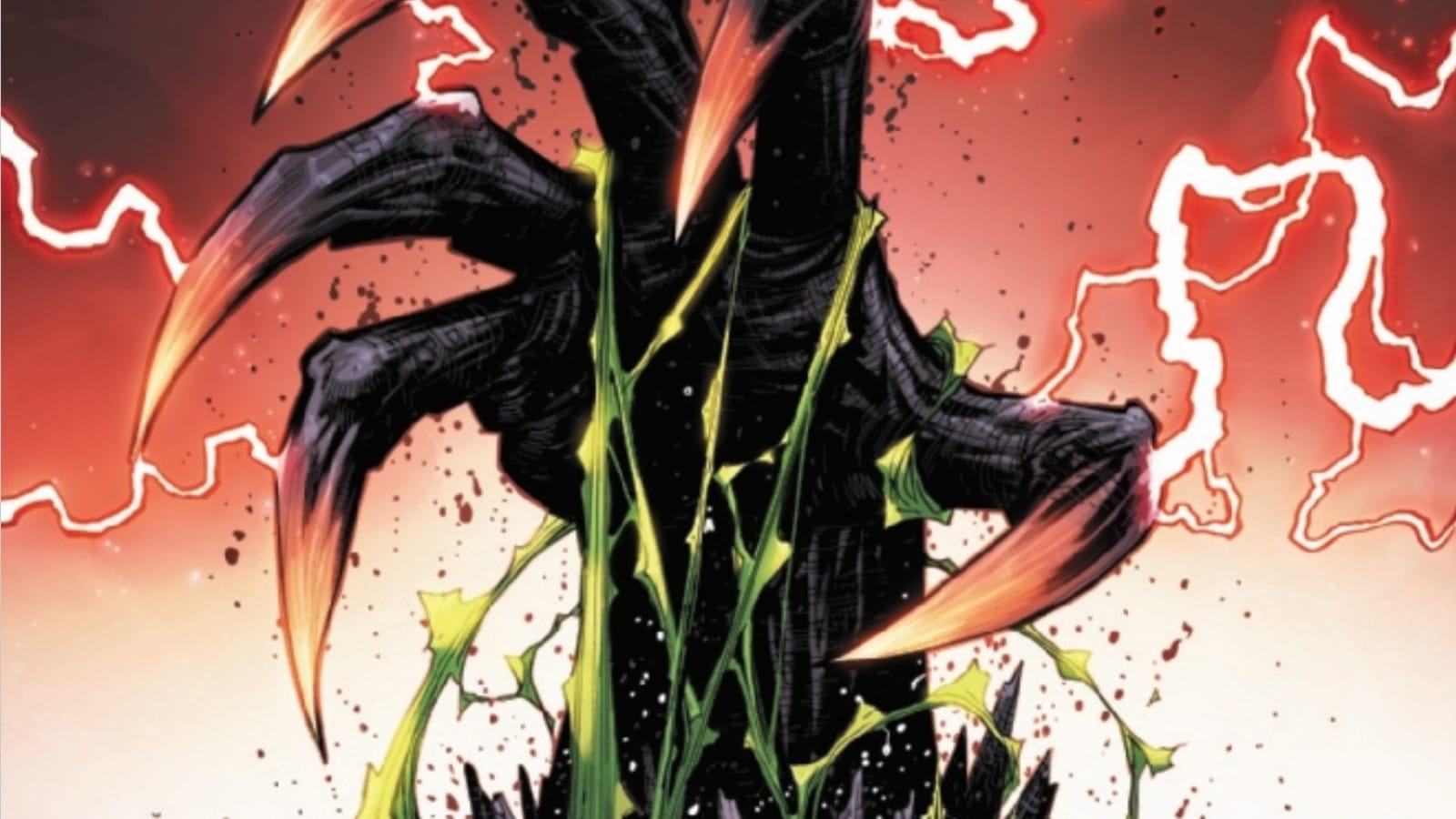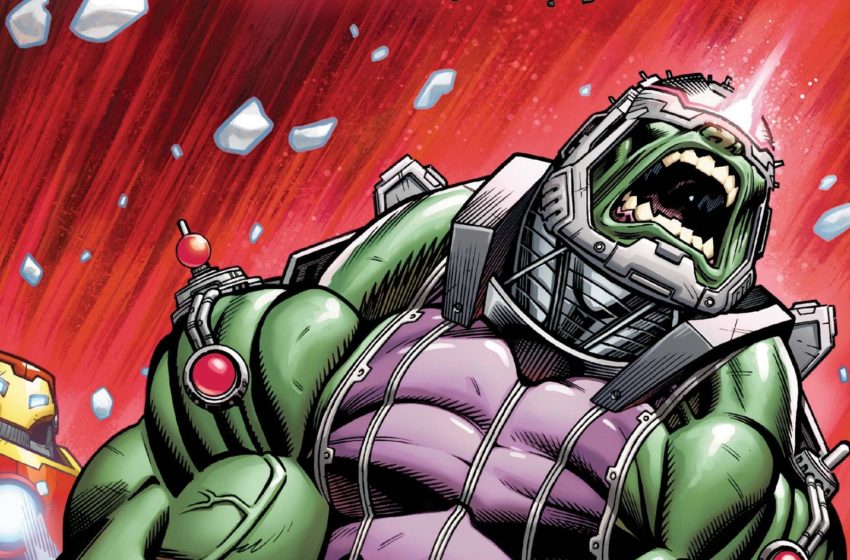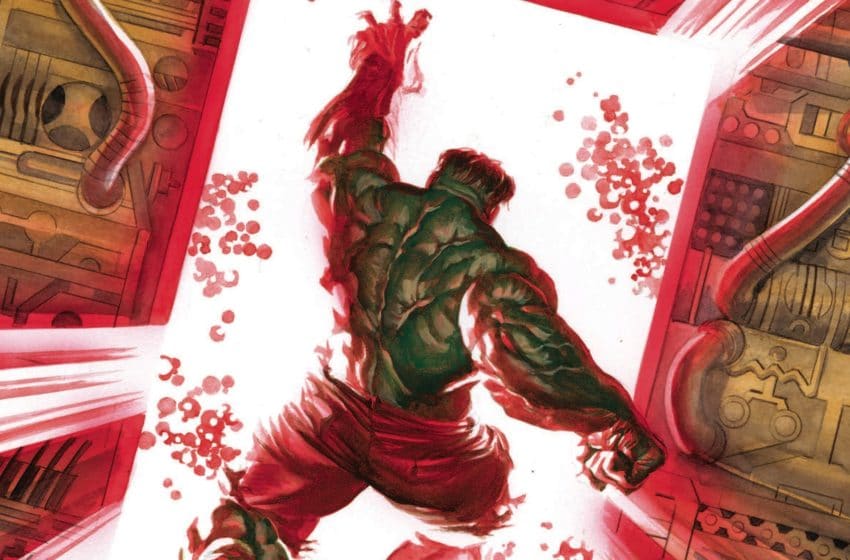Hulk tries to make nice with the world while the Leader lies in wait. It’s Immortal Hulk #35 by Al Ewing, Mike Hawthorne, Mark Morales, Paul Mounts, and Cory Petit.
Robert Secundus: I’m not sure if it’s been seven days or seven centuries since last we had the pleasure of reading The Immortal Hulk. Time is empty. The days and nights blur. I no longer know if I am awake or if I am dead. Is this hell? Maybe! And speaking of Hell… uh… this introduction got away from me. Hulk smash?
Cori McCreery: It’s been so long, yet so short. Nothing has meaning, it’s true, time is a construct created by the man to control us. DOWN WITH THE MAN! However, one thing is constant, and that is the joy of discussing comics with you, Robert.
The Shadow Always Follows
RS: We begin with a quote from EM Forster’s A Room With A View, a beloved book that I don’t particularly like. It concerns a woman in British Society refusing to marry an Unconventional Socialist Whomst Kissed Her In Italy until, well, she changes her mind and marries him. Forster was an interesting man though; he was an important voice in early 20th century British letters, and, though his A Path to India was problematic, it was still an attempt by a British writer to criticize British colonialism. His Maurice, a posthumously published gay romance based partially on his own life, might be a masterpiece. And even in this boring novel, as the quote shows, Forster was very much capable of writing a damn fine sentence. Cori, what did you think of the epigram, and how it fit into the issue?
CM: Myself, I have no knowledge of Mr. Forster’s works, but the thing I did know is that that quote is all kinds of awesome. It does feel a little bit pessimistic, in that no matter what good you try to do, there will always be some bad that comes along with it, but then those are the times in which we live. All we can hope is that our light provides more hope than the darkness our shadows bring. We just have to strive to not be overcome by the darkness and instead try to diminish our shadows as much as we can. And I think that’s something we saw Banner attempting to do here. His shadow, much like his rampaging personas, has been vast, and has caused a lot of pain through the years, but now he has an opportunity to make amends, and at the very least he’s making an attempt.
RS: So do you think Ewing is using the quote to criticize that attempt? Or to cast doubt on Banner’s ability to succeed? In this issue we do see him try to rebuild a town he destroyed– and the result is a pile of skeletons. Or do you think there’s a nobility in the attempt at kindness, even if Banner is called to recognize that no matter what, “the shadow always follows”?
CM: I don’t think it has to be one or the other, really. I think it’s nuanced. There is of course a nobility to attempting to make amends, even if those attempts don’t pan out. Of course with the Hulk though, there is a near insurmountable amount of damage to atone for, and obviously Bruce has his own demons as well. We saw three attempts at atonement in this issue, all of them to varying degrees of sincerity and effectiveness. The first was Banner making amends with the Hulk, and that one does seem to have been handled better than the other two, but it’s a sign of progression that attempts are even being made. What did you think of the other two attempts to atone for past mistakes and misdeeds?
RS: I have very different thoughts about each. His attempt to make amends with the community he heart does end, as I mentioned before, explosively, but this isn’t due to any natural meanness that must exist in the shadow of kindness’ light; this is due entirely to an evil man acting violently. The Hulk is blameless. On the other hand, when Banner confronts Betty, he does so with anger, resentment, and an unwillingness to acknowledge who she is as a person in her entirety. He chooses to lash out and to deny that the Harpy is her. It is one of the first times this series that I’ve really found myself despising Bruce Banner. I mean, come on dude. Take it to therapy. But in both cases, I don’t see the fatalism of Forster’s George Emerson; in both cases I don’t see a shadow that must exist. I see broken people choosing to be cruel.
CM: It’s telling that the one time an attempt is made without biases or influences, it’s the time with the most success. We see that Banner is able to look within, identify his own shortcomings and pass the olive branch. But we’re also alerted to just how difficult that was for him. It’s been years of denying evidence and diagnoses, of trying to believe himself more whole than he is. In doing so he’s caused himself untold amounts of harm, and has done compounding damage to those he cares about and who care about him.
Inner Worlds and Undergrounds
CM: In fact, that admittance is something that hit a little close to home for me. I have my own history with people who don’t come to terms with their own mental health issues. It’s caused rampant destruction within our family, as a denial of a simple diagnosis and treatment has led to much wider problems. By admitting that he’s done wrong by the Hulk, and that his refusal of his diagnosis has led to other mental health woes, Banner takes an important step forward in making himself better. It’s a process, however, as we see with his interaction with Betty, he’s still not quite there. There’s still a lot of projection and anger being directed at people and things that are not at fault. He’s angry with his own actions, with his own failures, yet it’s Betty that has to take the brunt of his rage and vitriol. What do you think about the portrayal of Bruce’s mental health struggles in this issue?
RS: It also feels realistic to my experiences involving people who refuse to confront problems with their mental health, and the damage such people can inflict on those around them. It also, I think, reflected something I’ve experienced, and something I think is a common experience, in my own head. When you’re Unwell, and you stumble across something in there, when you find chains, you often wonder: did I put those there myself? Or are they something done to me? The answer on some level doesn’t matter; either way, there are chains, and they must be broken. But on another level it matters quite a lot: if you don’t know why something is in your head, or you don’t know where it came from, there’s an extreme terror there. You might not know how to break those chains. You might not know if there are more slinking their ways into your skull, or if more links are already there.
CM: Yeah, definitely. The chains, and really the whole of Banner’s “Inner World” reminds me of another bit of comics related media that’s been tackling heavy mental health issues. Banner’s “Inner World” is eerily similar to the “Underground” of Doom Patrol’s Crazy Jane. Both are characters that are struggling with Dissociative Identity Disorder, and the imagery used to convey this disorder is consistent enough to be worth mentioning. The details are different, and Jane’s “Underground” is more organized than Banner’s, but the themes are the same. It’s a place for all the alternate personalities to gather, and a place where one can decide to take control of the wheel per se. With Jane, it’s a series of subway stops, with differing stations for each personality. For Hulk it’s a vast desert wasteland. When one of Jane’s alters shuts down, their station is closed and trains just run right through. When one of Banner’s shuts down, it has to be chained away and locked up for his own protection. The similarities and differences here are compelling and speak to the differing struggles of the two characters. Jane gets to be more organized and more in control, because she’s been in a place of acceptance about it longer than Banner. Perhaps one day, Banner’s “Inner World” can be as safe and comfortable as Jane’s stations.
RS: It’s an interesting comparison. I’m also reminded of the way Legion has been portrayed, particularly in X-Men: Legacy and in the Legion television series. David tends at times towards the Hulk’s prisons and wastelands, and at times to psychescapes closer in optimism to Jane’s; but his prisons are associated with the kind of control and organization that she has. It’s an interesting and problematic trope, the Superhero Whose Superpowers Are Tied To DID, who has a Psychic Landscape We Can Explore. Moon Knight too has explored some territory like this recently, particularly in the Lemire/ Smallwood run. I think often the trope has, historically, been harmful, but both Doom Patrol (especially its more recent manifestations) and Immortal Hulk feel far less problematic to me than other examples, and they also feel much closer to each other in their use of the trope than the others I mention, but I can’t quite put my finger on why I feel that way. I’m also wondering why this is a trope at all in superhero fiction; something about the genre’s emphasis on secret identities? I just don’t know.
CM: I think some of it comes from having to try to represent such an abstract and misunderstood disorder in a more structured and easier to parse way for the general audience who doesn’t know how it works. I’m a psychology major, I’ve read parts of the DSM in my spare time because I thought that they were interesting. I have a better understanding of mental illness and disorders than a lot of people, but there is still a lot there that nobody fully understands. Structuring the representation of DID like this makes it easier to digest, makes it easier to grasp the general idea of what’s going on. Both Immortal Hulk and Doom Patrol do a good job of that, I feel, and both of them feel like sincere representations of the disorder. They’re not making the characters into jokes, but allowing the reader or viewer to better understand and empathize with a very real problem that people have.
RS: That makes sense; what do you make of the DID=Superpower equation in both series? I know connecting mental illness to superpowers is a longstanding problematic trope, but again,even if not entirely successfully, it feels like these series differ somehow in their approach to the matter that makes it feel less off.
CM: There’s certainly still a level of problematic to the representation for sure. In a sense it’s a form of ableism in that these characters are given superpowers to counteract their disorders and disabilities. That said, I think there’s a level of difference here in how those powers vary for the two examples. Hulk only really has the one powerset for all of his alternate selves. He gets big and he smashes things and he’s hard to kill. With Jane, her powers are more intricately tied to whichever persona has the wheel, and there are many, many more personas that Banner has. While both are still rooted in the problematic origins of the trope, there’s more about them that is compelling. For Hulk, it’s that his power is one of self preservation and protection; a way to shield himself from a world that doesn’t understand him, and fears him. For Jane, it’s seeing just how those personalities’ powers manifest, and how the interplay between them works.
He’s Rather Sweet
RS: Before it acquired Xemnu, we saw Roxxon begin an attempt at branding and profiting on The Hulk. It sold Hulk masks; it made its own manufacturing part of the Hulk social movement. Then Xemnu co-opted the Hulk persona for his own ends, using the media to replace The Devil Hulk with The Magic Planet. Now Xemnu’s gone but, well, it seems like either his magic remains, or The Leader has picked up where Roxxon left off, given the series of panels that, mirroring those depicting Xemnu’s mind control in previous issues, show us folks who think the Hulk is… nice. The Hulk isn’t smashing the state here; he’s no threat to the establishment. This is what’s called “Recuperation”: the capitalist, liberal society “recuperates” radical ideas that would be a threat to its order by claiming their language and altering the denotation of the language used to express those ideas to something innocuous. Take the phrase “Black Lives Matter”: a radical call for radical change that is now being used by politicians who want to give more money to police departments. The organization Black Lives Matter still works for radical change, but if an individual says the words “Black Lives Matter,” they may be expressing a desire for radical change, or may be expressing a desire for moderate change. They might be satisfied with extra body-cams. ANYWAY. HULK. Sorry. Cori, what do you make of the Hulk’s new place in society? And what does this indicate for the Devil Hulk’s plans?
CM: I say, “Defund the Police!” And I feel like this is something that comes to a head in the nearish future of this series as I don’t believe the Devil Hulk is going to accept himself being made out to be such a nice dude. It doesn’t fit the scope of his plans, and it certainly doesn’t fit his methodology. It’s telling to me that this abrupt shift in cultural acceptance just happens to occur while the Devil Hulk is chained away, unable to express his own feelings about this phenomena. Kind of a less permanent version of what happened with Martin Luther King Jr. Devil Hulk will be back, and will make his feelings known, but the watering down of their ideals while they can’t argue against it seems similar, ya know?
RS: Oh, the way White “Moderates” and conservatives have misrepresented Martin Luther King Jr.’s politics is, I think (in my relatively politically uneducated understanding) a perfect illustration of how a governing order recuperates a radical figure. I really am excited to see what will emerge from that iron maiden; will the Devil Hulk as we have known him be able to start again the destruction of the Human World? Or is he no longer able to function as a revolutionary figure? Will he need something new? And how will the destruction at the end of this issue affect his or serve the Leader’s plans?
CM: We briefly touched on that explosive climax earlier, but it’s definitely important, and I wonder if this death might lead to the rebirth of the Devil Hulk. I’m not entirely sure of what happened with Rick, but I have to assume that this is part of the Leader’s machinations. I think that the fact that this happened during a public apology tour is also significant, and may actually work to Devil Hulk’s benefit, as it may shift that cultural barometer back to a place where he can still do the work that he needs to do. What do you think caused the overload?
RS: Either the Leader intentionally zapped him with, uh, Hell Energy, or the Leader understands Hell far less than he thinks. Maybe the contact between two gamma-soaked individuals was too much stress for the body already stressed by the imprisonment of the Devil and the forced presence in the sun? I’m not sure.
CM: Either way, it’s uh… not great. Kinda messy. Reminds me of Nightwing’s wedding. But overall, this issue was another great opening salvo for the coming arc, and I’m excited to see what is coming next.
RS: Every time, 35 issues in. Every time. That last page reveal still gets me.
Marvelous Musings
- That poor mayor, he didn’t deserve to be popped like a marshmallow in a microwave.
- Betty leaving really feels like a nice set-up for the one-shot coming in the near future.
- Captain America’s full of doggie doo. Hulk was long gone by the time he joined up, so why would he have any positive feelings about Hulk’s very brief tenure as an Avengers founder?






